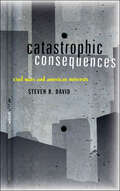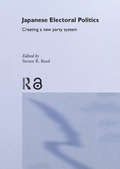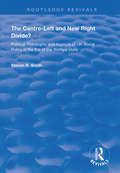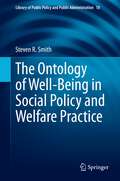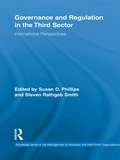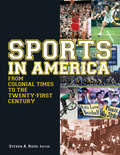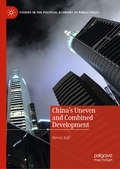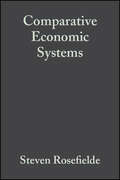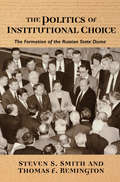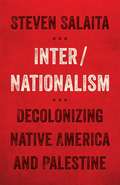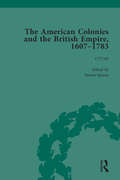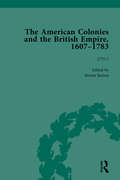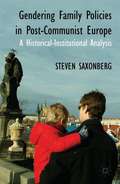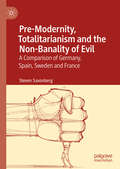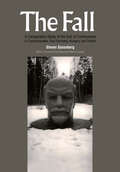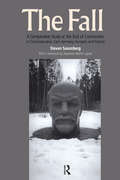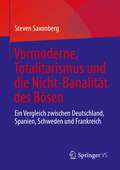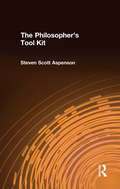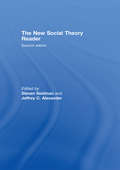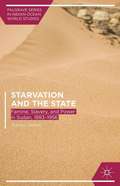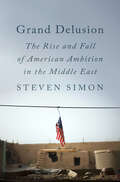- Table View
- List View
Catastrophic Consequences: Civil Wars and American Interests
by Steven R. DavidA look at how civil upheaval in foreign nations is becoming a greater threat to the United States than international warfare, and what must be done.Civil war and other types of radical domestic upheaval are replacing international war as the preeminent threat to American security and economic well-being, according to Steven R. David. Catastrophic Consequences argues that civil conflicts are of even greater importance than deliberate efforts to harm the United States because the damage they inflict is unintended and therefore impossible to deter.David examines the prospects for and potential aftereffects of instability in four nations vital to U.S. national interests: Saudi Arabia, Pakistan, China, and Mexico. It is not a rising China that threatens America, but one that is falling apart. Likewise, the United States should not worry over a hostile Pakistani regime, but rather one that cannot keep the country together. Similarly, a conflict-torn Mexico or Saudi Arabia poses a far greater danger to America than does either of those states growing stronger.In assessing these threats, David contends that the United States’s only viable option is to view other-state civil upheaval similarly to natural disasters and to develop a coherent, effective emergency response mechanism, which does not exist today in any systemic, nationwide form.“David is not a doomsayer or an advocate or liberal interventionism. He does not argue that the United States can or should mediate in civil wars. Instead, he calls for a cold-hearted examination of countries suffering collapse, with disciplined attention to the potential damage to American interests . . . David’s book offers a promising new beginning for a difficult and pressing set of issues.” —Jeremi Suri, Political Science Quarterly
Japanese Electoral Politics: Creating a New Party System (Nissan Institute/Routledge Japanese Studies)
by Steven R. ReedThe old Japanese single-party system collapsed in 1993, but a new system has not yet fully evolved. Following the most significant party reform in Japanese history, this book analyses the most recent national elections, examining voter behaviour and how it is influenced. It provides a comprehensive overview of Japanese politics from 1955 to 1993 and a detailed historical study of events leading up to the 1996 and 2000 elections, before presenting statistical analysis of the elections themselves. The authors then look to the future, anticipating what form the new political system will take. Japanese Electoral Politics contains four very detailed case studies and a wealth of new data. It will appeal to students and researchers of Japanese politics and elections and electoral systems.
The Centre-left and New Right Divide?: Political Philosophy and Aspects of UK Social Policy in the Era of the Welfare State (Routledge Revivals)
by Steven R. SmithFirst published in 1998, this volume offers some solutions to the inherent difficulties with moving from philosophical generalities to specific policies, by exploring how a bridge might be built between political philosophy and social policy analysis. In light of these findings, Steven R. Smith evaluates the relationship between the Centre-Left and the New Right, focusing on the way in which concepts of individual autonomy and equality are used by political philosophers and social policy makers. Smith explores post-1945 training, education, social security and community care policy within the United Kingdom.
The Ontology of Well-Being in Social Policy and Welfare Practice (Library of Public Policy and Public Administration #18)
by Steven R. SmithThis book provides important philosophical insights concerning the kind of creatures we are such that we can experience something we understand as well-being, with these insights then being applied to various areas of social policy and welfare practice. The author defends what he calls The Ontology of Well-Being Thesis (TOWT), addressing ontological questions about the human condition, and how these questions are fundamental to issues concerning what we might know about human well-being and how we should promote it. Yet, surprisingly, these ontological questions are often side-lined in academic, political, and policy and practice based debates about well-being. Addressing these questions, head-on, six features of the human condition are identified via TOWT: human embodiment, finiteness, sociability, cognition, evaluation, and agency. The main argument of the thesis is that these features reveal the conflicting character of human experiences, which can, in turn, have a profound bearing on our experience of well-being. Notably, it is our conflicting experiences of time, emotion, and self-consciousness, which can potentially help us experience well-being in complex and multi-dimensional ways. The author then applies these insights to various social policies and welfare practices, concerning, for example, pensions, disability, bereavement counselling, social prescribing within health settings, the promotion of mental health, and co-production practices. This book is of importance to philosophers, social policy analysts, and welfare practitioners and is also relevant to the fields of psychology, sociology, politics, and the health sciences.
Governance and Regulation in the Third Sector: International Perspectives (Routledge Studies in the Management of Voluntary and Non-Profit Organizations)
by Steven Rathgeb Smith Susan D. PhillipsGovernance and Regulation in the Third Sector brings together scholars and experienced practitioners from different countries to investigate the relationship between regulation and relational governance for the third sector in a comparative context. Each chapter reviews recent regulatory changes in the country in question. To what extent are there significant convergences in these reforms and what are the implications for the third sector? Is there any evidence that the foundational architecture for a more collaborative relationship between the state and the third sector has been laid? Overall, the book reveals that the reality of the supposedly new collaborative relationships and the impacts of regulatory reform are quite different from what contemporary theories of public management would have us believe. Recognizing the gap between theory and reality, the chapters explore some of the outstanding challenges for regulatory reform for the third sector.
Sports in America: From Colonial Times to the Twenty-First Century
by Steven RiessProvides practical help for the day-to-day concerns that keep managers awake at night. This book aims to fill the gap between the legal and policy issues that are the mainstay of human resources and supervision courses and the real-world needs of managers as they attempt to cope with the human side of their jobs.
Accountability in State Legislatures (Chicago Studies in American Politics)
by Steven RogersA troubling portrait of democracy in US state legislatures. State legislatures hold tremendous authority over key facets of our lives, ranging from healthcare to marriage to immigration policy. In theory, elections create incentives for state legislators to produce good policies. But do they? Drawing on wide-ranging quantitative and qualitative evidence, Steven Rogers offers the most comprehensive assessment of this question to date, testing different potential mechanisms of accountability. His findings are sobering: almost ninety percent of American voters do not know who their state legislator is; over one-third of incumbent legislators run unchallenged in both primary and general elections; and election outcomes have little relationship with legislators’ own behavior. Rogers’s analysis of state legislatures highlights the costs of our highly nationalized politics, challenging theories of democratic accountability and providing a troubling picture of democracy in the states.
China’s Uneven and Combined Development (Studies in the Political Economy of Public Policy)
by Steven RolfThis book mobilises the theory of uneven and combined development to uncover the geopolitical economic drivers of China’s rise. The purpose is to explain the formation and trajectory of its economic ‘accumulation system’ — which remains a confounding hybrid of statist and neoliberal forms of capitalism — as the outcome of China’s geopolitical engagement of the USA during the late stages of the Cold War, and its participation in manufacturing global production networks (GPNs). Fear of geopolitical catastrophe drove China to open its economy, while GPNs enabled China to generate substantial export surpluses which could be recycled through state-owned banks as cheap credit and subsidies to large, vertically integrated and politically-controlled state-owned enterprises. In this way, a synergy emerged between the ‘neoliberal’ and ‘Keynesian-Fordist’ sectors of the economy, while the national-territorial state retained its form and expanded its functions. The book chronicles how this reliance on export surpluses, however, rendered China extremely vulnerable to external shocks — prompting a dramatic monetary and fiscal stimulus response to the crisis of 2008, even while sustaining the illusion of economic ‘decoupling’ from the global economy. Finally, it examines the growing role of the state in the current crisis-ridden economic model, as well as China’s current geoeconomic and geopolitical expansionism in areas such as the Belt and Road Initiative and the militarisation of the East and South China Seas.
Comparative Economic Systems: Culture, Wealth, and Power in the 21st Century
by Steven RosefieldeComparative Economic Systems: Culture, Wealth and Power in the 21st Century explains how culture, in various guises, modifies the standard rules of economic engagement, creating systems that differ markedly from those predicted by the theory of general market competition. This analysis is grounded in established principles, but also assumes that individual utility seeking may be culturally determined, that political goals may take precedence over public well being, and that business misconduct may be socially detrimental.
American War Plans, 1941-1945: The Test of Battle
by Steven RossThis is an examination of major American and Anglo-American war plans. Rather than discuss the history of planning, Ross considers the execution of the plans, compares the execution with the expectations of the planners and attempts to explain the differences.
The Politics of Institutional Choice: The Formation of the Russian State Duma
by Steven S. Smith Thomas F. RemingtonEvents in Russia since the late 1980s have created a rare opportunity to watch the birth of democratic institutions close at hand. Here Steven Smith and Thomas Remington provide the first intensive, theoretically grounded examination of the early development of the State Duma, the lower house of the Russian Federation's parliament created by the 1993 constitution. They offer an integrated account of the choices made by the newly elected members of the Duma in establishing basic operating arrangements: an agenda-setting governing body, a standing committee system, an electoral law, and a party system. Not only do these decisions promise to have lasting consequences for the post-communist Russian regime, but they also enable the authors to test assumptions about politicians' goals from the standpoint of institutional theory. Smith and Remington challenge in particular the notion, derived from American contexts, that politicians pursue a single, overarching goal in the creation of institutions. They argue that politicians have multiple political goals--career, policy, and partisan--that drive their choices. Among Duma members, the authors detect many cross currents of interests, generated by the mixed electoral system, which combines both single-member districts and proportional representation, and by sharp policy divisions and an emerging party system. Elected officials may shift from concentrating on one goal to emphasizing another, but political contexts can help determine their behavior. This book brings a fresh perspective to numerous theories by incorporating first-hand accounts of major institutional choices and placing developments in their actual context.
Inter/Nationalism: Decolonizing Native America and Palestine (Indigenous Americas)
by Steven Salaita&“The age of transnational humanities has arrived.&” According to Steven Salaita, the seemingly disparate fields of Palestinian Studses and American Indian studies have more in common than one may think. In Inter/Nationalism, Salaita argues that American Indian and Indigenous studies must be more central to the scholarship and activism focusing on Palestine. Salaita offers a fascinating inside account of the Boycott, Divestment, and Sanctions (BDS) movement—which, among other things, aims to end Israel&’s occupation of Palestinian land. In doing so, he emphasizes BDS&’s significant potential as an organizing entity as well as its importance in the creation of intellectual and political communities that put Natives and other colonized peoples such as Palestinians into conversation. His discussion includes readings of a wide range of Native poetry that invokes Palestine as a theme or symbol; the speeches of U.S. President Andrew Jackson and early Zionist thinker Ze&’ev Jabotinsky; and the discourses of &“shared values&” between the United States and Israel. Inter/Nationalism seeks to lay conceptual ground between American Indian and Indigenous studies and Palestinian studies through concepts of settler colonialism, indigeneity, and state violence. By establishing Palestine as an indigenous nation under colonial occupation, this book draws crucial connections between the scholarship and activism of Indigenous America and Palestine.
Uncivil Rites
by Steven SalaitaIn the summer of 2014, renowned American Indian studies professor Steven Salaita had his appointment to a tenured professorship revoked by the board of trustees of the University of Illinois at Urbana-Champaign. Salaita's employment was terminated in response to his public tweets criticizing the Israeli government's summer assault on Gaza.Salaita's firing generated a huge public outcry, with thousands petitioning for his reinstatement, and more than five thousand scholars pledging to boycott UIUC. His case raises important questions about academic freedom, free speech on campus, and the movement for justice in Palestine.In this book, Salaita combines personal reflection and political critique to shed new light on his controversial termination. He situates his case at the intersection of important issues that affect both higher education and social justice activism.ependent scholar.
The American Colonies and the British Empire, 1607-1783, Part II vol 8
by Steven SarsonThis second part of an eight-volume reset edition, traces the evolution of imperial and colonial ideologies during the British colonization of America. It covers the period from 1764 to the end of the American Revolutionary War in 1783.
The American Colonies and the British Empire, 1607-1783, Part II vol 7
by Steven Sarson and Jack P. GreeneThis second part of an eight-volume reset edition, traces the evolution of imperial and colonial ideologies during the British colonization of America. It covers the period from 1764 to the end of the American Revolutionary War in 1783.
Gendering Family Policies in Post-Communist Europe
by Steven SaxonbergThrough the use of a historical-institutional perspective and with particular reference to the Czech Republic, Hungary, Poland and Slovakia; this study explores the state of family policies in Post-Communist Europe. It analyzes how these policies have developed and examines their impact on gender relations for the countries mentioned.
Pre-Modernity, Totalitarianism and the Non-Banality of Evil: A Comparison of Germany, Spain, Sweden and France
by Steven SaxonbergThis book provides a comparative and historical analysis of totalitarianism and considers why Spain became totalitarian during its inquisition but not France; and why Germany became totalitarian during the previous century, but not Sweden. The author pushes the concept of totalitarianism back into the pre-modern period and challenges Hannah Arendt’s notion of the banality of evil. Instead, he presents an alternative framework that can explain why some states become totalitarian and why they induce people to commit evil acts.
The Fall: A Comparative Study of the End of Communism in Czechoslovakia, East Germany, Hungary and Poland
by Steven SaxonbergWith a foreword by Seymour Lipset, Hoover Institution and George Mason University, USAThe Fall examines one of the twentieth century's great historical puzzles: why did the communist-led regimes in Eastern Europe collapse so quickly and why was the process of collapse so different from country to country? This major study explains why the impetus for change in Poland and Hungary came from the regimes themselves, while in Czechoslovakia and East Germany it was mass movements which led to the downfall of the regimes.
The Fall: A Comparative Study of the End of Communism in Czechoslovakia, East Germany, Hungary and Poland
by Steven SaxonbergWith a foreword by Seymour Lipset, Hoover Institution and George Mason University, USAThe Fall examines one of the twentieth century's great historical puzzles: why did the communist-led regimes in Eastern Europe collapse so quickly and why was the process of collapse so different from country to country? This major study explains why the impetus for change in Poland and Hungary came from the regimes themselves, while in Czechoslovakia and East Germany it was mass movements which led to the downfall of the regimes.
Transitions and Non-Transitions from Communism
by Steven SaxonbergSince the fall of the Berlin Wall, many scholars have sought to explain the collapse of communism. Yet, more than two decades on, communist regimes continue to rule in a diverse set of countries including China, Cuba, North Korea and Vietnam. In a unique study of fourteen countries, Steven Saxonberg explores the reasons for the survival of some communist regimes while others fell. He also shows why the process of collapse differed among communist-led regimes in Europe, Africa and Latin America. Based on the analysis of the different processes of collapse that has already taken place and taking into account the special characteristics of the remaining communist regimes, Transitions and Non-Transitions from Communism discusses the future prospects for the survival of the regimes in China, Cuba, North Korea and Vietnam.
Vormoderne, Totalitarismus und die Nicht-Banalität des Bösen: Ein Vergleich zwischen Deutschland, Spanien, Schweden und Frankreich
by Steven SaxonbergDieses Buch bietet eine vergleichende und historische Analyse des Totalitarismus und geht der Frage nach, warum Spanien während der Inquisition totalitär wurde, Frankreich aber nicht; und warum Deutschland im vergangenen Jahrhundert totalitär wurde, Schweden aber nicht. Der Autor verlegt das Konzept des Totalitarismus zurück in die Vormoderne und stellt Hannah Arendts Vorstellung von der Banalität des Bösen in Frage. Stattdessen stellt er einen alternativen Rahmen vor, der erklären kann, warum manche Staaten totalitär werden und warum sie Menschen zu bösen Handlungen verleiten.
The Philosopher's Tool Kit
by Steven Scott AspensonA concise introduction to the basic elements of argumentative prose and the conceptual tools necessary to understand, analyze, criticize, and construct arguments: as well as to the philosophical mainstays of metaphysics, epistemology, and philosophical analysis.
The New Social Theory Reader
by Steven Seidman; Jeffrey C. AlexanderThis is the first anthology to thematize the dramatic upward and downward shifts that have created the new social theory, and to present this new and exciting body of work in a thoroughly trans-disciplinary manner. In this revised second edition readers are provided with a much greater range of thinkers and perspectives, including new sections on such issues as imperialism, power, civilization clash, health and performance. The first section sets out the main schools of contemporary thought, from Habermas and Honneth on new critical theory, to Jameson and Hall on cultural studies, and Foucault and Bourdieu on poststructuralism. The sections that follow trace theory debates as they become more issues-based and engaged. They are:the post-foundational debates over morality, justice and epistemological truththe social meaning of nationalism, multiculturalism and globalizationidentity debates around gender, sexuality, race, the self and post-coloniality.This new edition provides more ample biographical and intellectual introductions to each thinker, and substantial introductions to each of the major sections. The editors introduce the volume with a newly revised, interpretive overview of social theory today.The New Social Theory Reader is an essential, reliable guide to current theoretical debates.
Starvation And The State
by Steven SerelsSudan has historically suffered devastating famines that have powerfully reshaped its society. This study shows that food crises were the result of exploitative processes that transferred resources to a small group of beneficiaries, including British imperial agents and indigenous elites who went on to control the Sudanese state at independence.
Grand Delusion: The Rise and Fall of American Ambition in the Middle East
by Steven SimonA longtime American foreign policy insider&’s penetrating and definitive reckoning with this country&’s involvement in the Middle East—and its bitter endThe culmination of almost forty years at the highest levels of policymaking and scholarship, Grand Delusion is Steven Simon&’s tour de force, offering a comprehensive and deeply informed account of U.S. engagement in the Middle East. Simon begins with the Reagan administration, when American perception of the Middle East shifted from a cluster of faraway and frequently skirmishing nations to a shining, urgent opportunity for America to (in Reagan&’s words) &“serve the cause of world peace and the future of mankind.&”Reagan fired the starting gun on decades of deepening American involvement, but as the global economy grew, bringing an increasing reliance on oil, U.S. diplomatic and military energies were ever more fatefully absorbed by the Middle East until the Obama administration and its successors finally sought to disentangle America from the region. Grand Delusion explores the motivations, strategies, and shortcomings of each presidential administration from Reagan to today, exposing a web of intertwined events—from Lebanese civil conflict to shifting Iranian domestic politics, Cold War rivalries, and Saudi Arabia&’s quest for security to 9/11 and the war on terror—managed by a Washington policy process frequently ruled by wishful thinking and partisan politics.Simon&’s sharp sense of irony and incisive writing bring a complex history to life. He questions the motives behind America's commitment to Israel; explodes the popular narrative of Desert Storm as a &“good war&”; and calls out the devastating consequences of our mistakes, particularly for people of the region trapped by the onslaught of American military action and pitiless economic sanctions. Grand Delusion reveals that this story, while episodically impressive, was too often tragic and at times dishonorable. As we enter a new era in foreign policy, this is an essential book, a cautionary history that illuminates American's propensity for self-deception and misadventure at a moment when the nation is redefining its engagement with a world in crisis.
